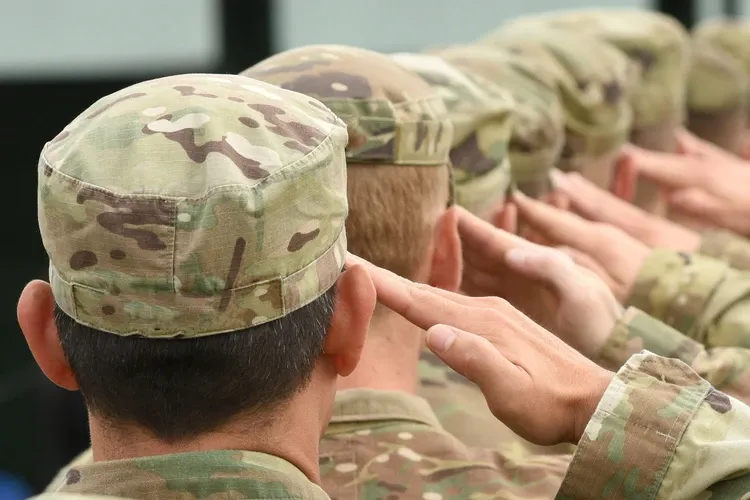The swelling epidemic of obesity among our active-duty service members is the elephant in the room we can no longer afford to ignore.
Nearly two-thirds of our military personnel currently reside within the overweight or obese range of the body mass index, according to a study from the American Security Project, a finding that has severe implications for their health, readiness, and ultimately our national security.
BMI levels exceeding thirty kilograms per height in meters squared are wreaking havoc on our service members. They cause insulin resistance, high blood pressure, hyperlipidemia, and vascular dysfunction, all of which endanger the lives of our soldiers. What's more, the concentration of excess fat around vital organs further complicates the body's ability to regulate insulin, maintain organ function, and control hunger and satiety signals. The daily stresses and sleep deprivation experienced by our active-duty personnel worsen the problem.
The repercussions of obesity are catastrophic. Service members wrestling with weight issues face up to a 47% increased risk of injuries, strokes, and musculoskeletal problems, according to the study. Respiratory, circulatory, and osteoarthritic challenges result in shortness of breath, fatigue, vascular dysfunction, and pressure on their joints and bones, which directly diminish exercise capacity and combat ability.
This crisis has cast a long shadow across our defense branches, but the problem particularly stands out in the Navy. With a shocking obesity rate of 27%, they conduct only one annual fitness test. This frequency is inadequate, as it takes only a few weeks to fall drastically out of combat-ready shape. This distressing fact raises questions about discipline and overall combat readiness.
A concerning aspect of this crisis is that nearly half of medical waivers granted for recruits joining the Marine Corps are given due to obesity. It is interesting that while handing out obesity waivers with little protest, the Marine Corps was also nearly absolute in refusing COVID vaccine exemptions, even though the shots are dangerous for the hearts of military-aged males.
Respiratory, circulatory, and osteoarthritic challenges result in shortness of breath, fatigue, vascular dysfunction, and pressure on their joints and bones, which directly diminish exercise capacity and combat ability.
The study also found that from the age of twenty-one to thirty-five, obesity rates climb from 15% to 28% among service members. At thirty-five, a person should be in the prime of their physical life, especially in the world's most well-funded military.
This escalating trend of obesity is a glaring indication of systemic leadership failures within the Department of Defense. True leaders should instill basic fundamentals like quality sleep, daily physical training, and the importance of simple, healthy meals. The notion that sleep is a luxury is misplaced in military training, especially when research reveals that training with inadequate sleep leads to cognitive impairment and weight gain.
BMI was reclassified in 2016 from a medical disqualification to an administrative one. This change allows Commanders to manipulate the diagnosis, which has deterred healthcare workers from diagnosing or addressing the weight problem, instead focusing on the subsequent comorbidities such as diabetes, osteoarthritis, and high blood pressure. Meanwhile health programs in the military, according to the study, are “influenced by movements to improve self-perception and reduce discrimination due to body size.” Recent studies have found that less than half of those enrolled in these programs met physical fitness standards within their next three physical fitness assessments.
The Department of Defense's Total Force Fitness Guide falls short of the mark: its recommendations include "saving room for a margarita" and "cooking with family members." These suggestions are, at best, impractical and, at worst, ridiculous. Our service members are often away on deployment or training, and alcohol consumption is detrimental to sleep and health.
This escalating trend of obesity is a glaring indication of systemic leadership failures within the Department of Defense. True leaders should instill basic fundamentals like quality sleep, daily physical training, and the importance of healthy meals.
The economic toll of obesity is already substantial, with the Pentagon spending $1.5 billion annually on obesity-related healthcare. Obese service members, on average, leave service eighteen months earlier than their peers.
The study adds “assumptions that overweight people are unmotivated, incompetent, or weak-willed cause individuals and services to conceal, obscure, and downplay military obesity.” Instead of addressing this strategic concern, the Pentagon has conjured a mirage of strength while presiding over the gradual erosion of military readiness. It's not only embarrassing but also justified to regard our overweight military forces with a social stigma. When one takes the oath to protect and defend, it necessitates the achievement and maintenance of physical and mental superiority over any potential adversary.
To combat this crisis, military recruiters should be permitted to lead regular in-class and after-class fitness programs in high schools and colleges across the nation. These programs would not only provide young individuals with quality training but also expose them to the discipline and mentorship that has traditionally defined our military.
For the majority of service members, the solution is not a healthcare worker confirming clinical unhealthiness. It costs nothing for enlisted and commissioned leaders to take the initiative, guide their subordinates to the gym, and instill the discipline and strength that our nation rightfully demands. There is no better remedy for obesity than a squat rack and track. Combine this with basic education on whole foods and advice on implementing intermittent fasting while not in the field, and we can make significant strides in resolving this issue.
We stand at a crossroads, and the path we choose will determine the future readiness of our armed forces. This crisis is not an abstract issue but a tangible threat to our national security. It is high time we address it with the gravity it deserves, implementing changes in policy and culture to rebuild our military's combat-ready force. Our national security depends on it.



